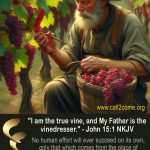
Matthew 25:1-13
The parable of the 10 virgins is a message of being appropriately prepared for the coming bridegroom, with the importance of oil being the central theme.
“For when the foolish took their lamps, they took no oil with them,but the wise took flasks of oil with their lamps.” Matthew 25:3-4 (ESV)
The very thing that distinguished the wise from the foolish was that the wise virgins had extra oil with them, and not just reliant on what was already in their lamps. During biblical times olive oil was the most common oil used in both everyday lamps as well as those that were continuously lit in the temple; therefore, it was most likely the oil Jesus was referencing to in the parable.
When considering the extra oil of the wise virgins, we would naturally think it was the quantity they had, but it was also the quality.
“Command the people of Israel to bring you pure oil from beaten olives for the lamp, that a light may be kept burning regularly. (Leviticus 24:2)
There are many different types of olive oil with ‘extra virgin’ being the highest quality, and it’s the extraction process which marks each one out. Extra virgin is the result of the first press of the olives, whereas the lower grades are mechanically recovered afterwards, leading to a lesser pure yield.
In the Old Testament the Lord spoke to Moses for the people to bring the purest oil to burn in the tabernacle. In the New Testament our bodies are now temples of the living God, which still requires a pure oil continuously burning within. At Pentecost the disciples received the Heavenly oil from above, the Holy Spirit, who has been with us ever since, dwelling within the Church and keeping a light burning for the coming Bridegroom.
The main extraction process of olive oil is pressing in. The very necessary thing we need to be doing if we are to be prepared for the Lord’s return. The foolish (those who had become complacent), will come asking for a share of the extra oil of the wise (those who had been proactive), but by then it will be too late. It is the responsibility for each person to have a share of their own oil, which comes only from a continuing personal experience of pressing into the presence of God.
“Afterward the other [foolish] virgins came also, saying, ‘Lord, lord, open to us. But he answered, ‘Truly, I say to you, I do not know you.’” Matthew 11-12 (ESV)
A lack of oil relates to a lack of knowledge, relationship or intimacy with the Bridegroom and results in a response of ‘I do not know you’. What a sobering thought that is. Therefore, let us not depend on the extra oil of others, but press in now and have our flasks abundantly filled with the oil of the Spirit.
“Then all those virgins rose and trimmed their lamps.” Matthew 25:7
The word ‘trimmed’ used here is ‘kosmeō’ which essentially means ‘to make ready’ or ‘to beautify’. It’s the root of the English word we would commonly use as ‘cosmetics’; and so, where the world would consider using cosmetics to make one look more beautiful, the bride is beautified because she trims or separates herself from such things of the world, lest it become a spot or blemish to her (Ephesians 5:27).
Only by the grace of God can she receive this most wonderful infilling of the Heavenly oil, so that she can arise as a radiant bride with a lamp of the purest light, piercing the darkness of the night to meet her coming beloved. Amen.
“For it is you who light my lamp; the Lord my God lightens my darkness.”
Psalm 18:28 (ESV)






